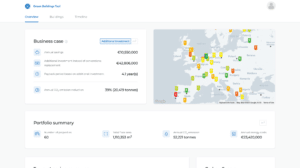
Reporting
Reporting on sustainability is becoming increasingly important. National and EU legislation are driving ESG reporting, but customers and other stakeholders also increasingly expect transparency regarding sustainability.
ESG reports
With the imminent arrival of the Corporate Sustainability Reporting Directive (CSRD), more and more companies will be required to report on sustainability. This can be achieved with the help of ESG reporting. An ESG report focuses on three elements: Environment, Social & Governance, which allows you to track your sustainability, identify risks and report on your sustainability performance. The EU taxonomy constitutes an important framework when reporting. The frameworks and guidelines in the EU taxonomy are still evolving, so making an ESG report can be challenging. Our consultants have extensive experience in preparing sustainability reports and would be happy to help you. For example, our experts previously helped Van der Vorm Vastgoed Groep prepare an ESG report and Argenta, a Belgium-based banking and insurance group, prepare a Methodology Report for green bonds. This sets out exactly what assets must comply with to be labelled ‘green’ and ‘eligible’.
We work together with
Standards in ESG and carbon reporting
Measuring and reporting on sustainability is important for financial institutions and property owners. Increasingly, shareholders, financiers and potential buyers are looking at a property or portfolio’s score when it comes to ESG and carbon impact. CFP helps clients create ESG and carbon reports using various reporting standards.

PCAF
The Partnership for Carbon Accounting Financials (PCAF) is a global initiative of financial institutions working together to develop an approach to determine greenhouse gas emissions from loans and investments. Using PCAF, financial institutions can map the carbon footprint per financing, set targets and report on it. This will enable them to align their portfolios with the Paris climate agreement.
CRREM
The Carbon Risk Real Estate Monitor (CRREM) was developed to help meet the Paris climate agreement. CRREM reveals the financial risks of poor energy performance and quantifies the financial implications of climate change for the building stock.


GRESB
The Global Real Estate Sustainability Benchmark (GRESB) is an independent benchmark used to measure sustainability of real estate funds. This includes a focus on all three components of ESG. GRESB examines compliance and implementation of sustainability policies, environmental performance of real estate portfolios and greenhouse gas emissions and waste streams, etc. Understanding energy and waste flows is crucial in this respect. With the help of certifications such as BREEAM, WELL and energy scans, you will get the insights needed to obtain and improve a GRESB score.
Green Buildings Tool
The CFP Green Buildings tool provides large-scale insights regarding energy usage, energy savings and emissions reductions. Entire portfolios, as well as single properties, can be loaded, after which the tool retrieves the energy label and sustainability or carbon score. It gives you all the data you need quickly and conveniently to get started with PCAF, CCREM standards and GRESB, resulting in comprehensive ESG reporting. Not only does the Green Buildings Tool save you as much as 75% in terms of time, but you will also immediately find out what further savings measures you can take in the future towards an energy-neutral building.
News and cases about reporting
Frequently Asked Questions
Why are sustainability reports important?
Sustainability reports are of vital importance because they enable us to better understand the impact of organizations on the environment and society. They provide insight into how companies address important sustainability issues such as climate change, energy consumption, water management, and social responsibility. Through these reports, organizations can be held accountable for their actions and promote transparency. It is crucial that we comprehend the impact of organizations on sustainability and that they provide full disclosure. This way, we can work together towards a sustainable and responsible future.
What are the key elements of an ESG report?
An ESG report typically includes information about a company’s environmental impact, social impact such as employee affairs and diversity, and governance aspects such as ethics and transparency. It may also encompass financial performance and non-financial objectives.
What are the key elements of a carbon report?
The key elements of a carbon report are: inventory of carbon emissions, clear objectives and KPIs, and the use of accurate emission factors for precise calculations. Together, they ensure a valuable report that reflects the impact of carbon emissions within your company.
Are reporting standards such as CRREM, PCAF, and GRESB mandatory?
Although these reporting standards are not legally required, they are increasingly being requested by investors, financial institutions, and other stakeholders. The use of standards like CRREM, PCAF, and GRESB can therefore be advantageous in attracting investments, meeting stakeholder requirements, and promoting sustainability.
What are the benefits of using reporting standards?
The use of reporting standards for ESG or CO2 reporting offers several advantages. It ensures consistency and comparability between organizations, encourages benchmarking, and promotes best practices. Furthermore, these standards facilitate communication with stakeholders and enhance the credibility of reports.












